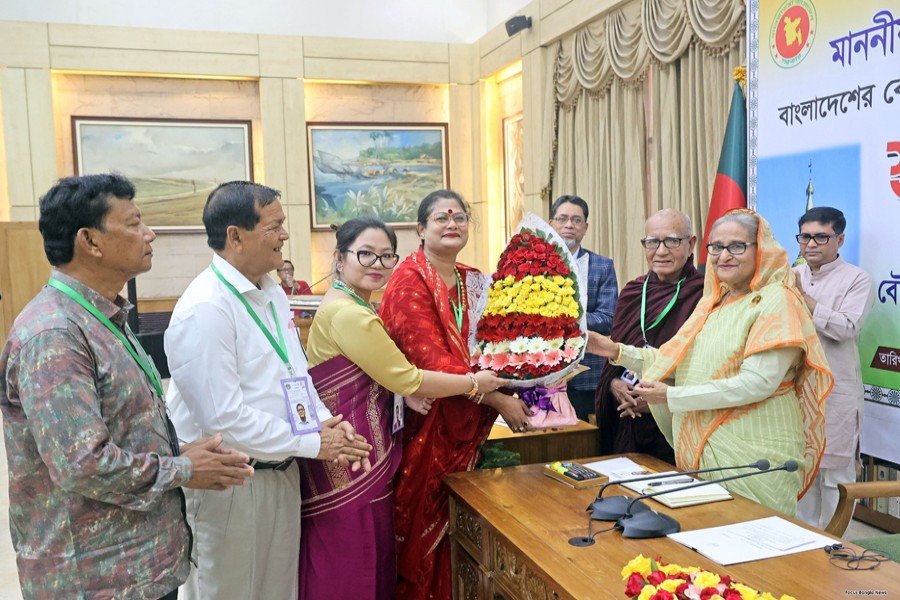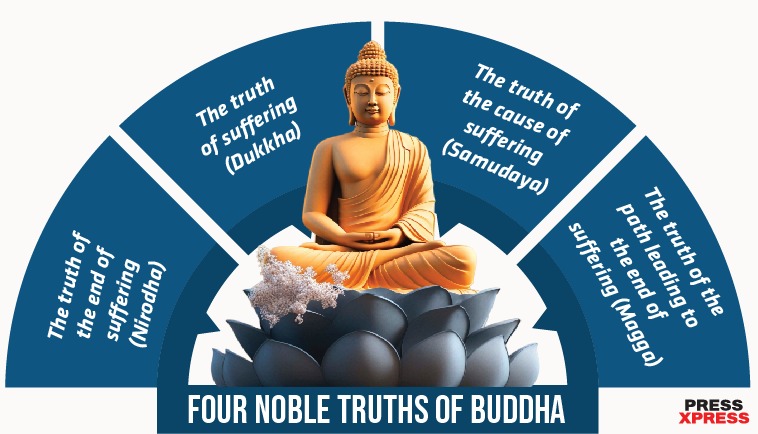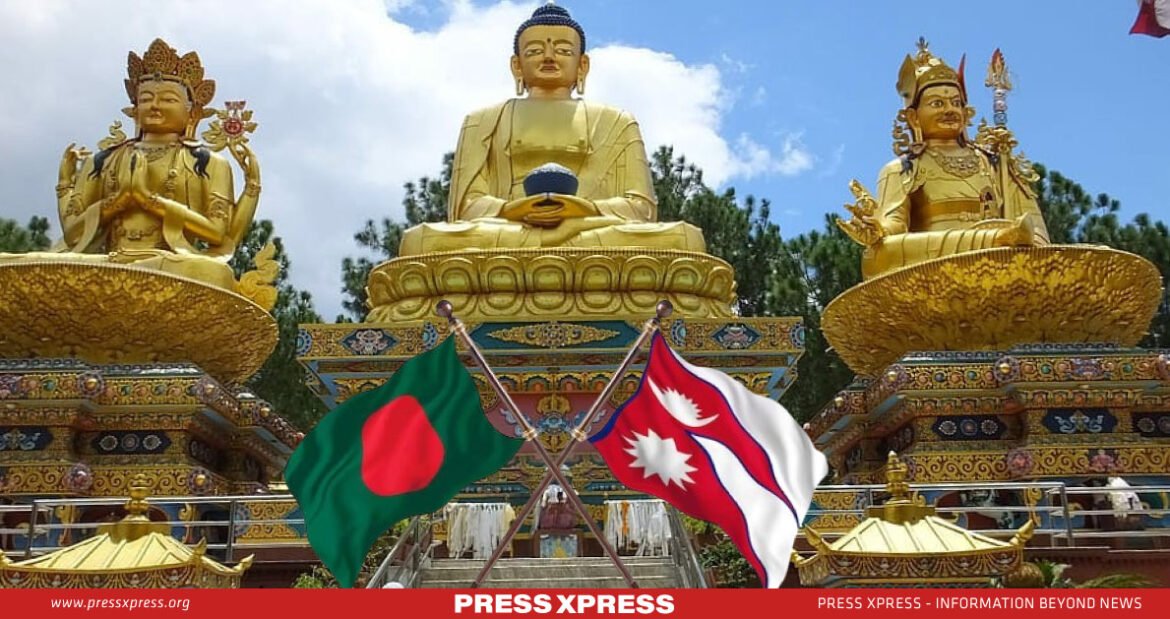Key Highlights:
- A Buddhist temple, a symbol of peace and unity, is set to rise in Nepal, funded by Bangladesh
- With approximately 488 million followers, the Asia-Pacific region boasts the highest number of Buddhists
- Significant festival like “Shubh Buddha Purnima” is celebrated in Bangladesh
Lord Gautam Buddha is one the most influential personality in the world. For some, his acts and advices serve as a religion; for others, it is a philosophy. Many also practice Buddhism as a mental discipline, using it to discover themselves and achieve inner peace.
Bangladesh has crafted a rich tapestry of religious diversity that surpasses sectarian confines. In a gesture of profound cultural and spiritual solidarity with the liberal tone, the Prime Minister of Bangladesh has announced an inspiring project that transcends borders and faiths.
You Can Also Read: RELIGIOUS HARMONY UPHELD BY AL GOVERNMENT
A Buddhist temple, a symbol of peace and unity, is set to rise in Nepal, funded by Bangladesh, at the very birthplace of Buddha. This monumental endeavor is the first-ever cultural and diplomatic step that not only will strengthen the ties between the two nations but also pay homage to the universal teachings of compassion and enlightenment that Buddha embodies.
“They will build a Buddha temple in Nepal on our behalf because we want to have a symbol of Bangladesh at the birthplace of Lord Gautam Buddha,” she said while exchanging pleasantries with religious leaders and eminent personalities of the Buddhist community on the occasion of Buddha Purnima, marking the birth, enlightenment, and death of Gautama Buddha.

She mentioned that the government has an agreement with Nepal’s Lumbini Development Trust under which this project will proceed. The premier reiterated that the Awami League government is dedicated to the socioeconomic development of all citizens, regardless of their religion.
The prime minister also highlighted a shared value across religions, as emphasized by Gautama Buddha: “The basic principle of every religion is human welfare.” Apart from the development of the Chittagong Hill Tracts, the government also works for the development of Buddhist communities in other parts of the country.

Promoting Buddhism’s Legacy of Peace
The birthplace of Lord Buddha in Lumbini, a UNESCO World Heritage Site, is a sanctuary of peace and a prime pilgrimage destination for Buddhist devotees and peace lovers worldwide. Born here in 623 BC, Lord Buddha (Siddhartha Gautama) imparted a universal message of peace and compassion, making Lumbini one of the most revered places for those who follow Buddhism.
Following Buddha’s death around 483 BCE, his teachings spread across India and beyond, reaching Sri Lanka, Southeast Asia, Central Asia, China, Korea, Japan, and Tibet. Today, Buddhism is a major world religion with hundreds of millions of followers, profoundly influencing global culture, philosophy, and spiritual practice.

How Bangladesh’s Diplomatic Temple Gesture Can Amplify Cultural Connections?
Buddhism is practiced by about 535 million people, representing 7% to 8% of the world’s total population. With approximately 488 million followers, the Asia-Pacific region boasts the highest number of Buddhists. The majority of Buddhists (99%) reside in the Asia-Pacific region, indicating a large potential influx of visitors from these areas- China, Thailand, Myanmar, India, and Sri Lanka.
By constructing a temple at the birthplace of Lord Gautam Buddha, Bangladesh is acknowledging and respecting the cultural and religious significance of Buddhism. The temple will serve as a symbol of Bangladesh in Nepal, enhancing its visibility and influence in the region.
This initiative aligns with the principles of Buddhism, promoting peace, harmony, and human welfare, thereby improving Bangladesh’s image internationally. The temple is being built in Lumbini, Nepal, the birthplace of Gautam Buddha, which is a major pilgrimage site for Buddhists.
In recent years, the Bangladeshi government has initiated several projects to highlight the nation’s Buddhist heritage. In 2015, in partnership with the United Nations World Tourism Organization (UNWTO), Bangladesh hosted its first international conference in Dhaka, titled “Developing Sustainable and Inclusive Buddhist Heritage and Pilgrimage Circuits in South Asia’s Buddhist Heartland.”
By fortifying connections with Nepal, Bangladesh can strategically balance its relationships with other influential regional players such as India and China, thereby bolstering its geopolitical stature. Assuming a modest increase of 10,000 additional pilgrims annually to the temple, this could substantially enrich cultural interactions.
Strides for Religious Inclusion in Bangladesh
Bangladesh’s dedication to maintaining religious harmony shines through its initiatives to protect the rights of all religious groups, nurturing an atmosphere where individuals of diverse faiths can freely practice their beliefs and collectively contribute to the nation’s advancement.
Since 2013, donations have been channeled towards aiding impoverished individuals and Buddhist monks. By 2023, a cumulative grant totaling 53 lakh 61 thousandtakas has been allocated for the treatment of 408 beneficiaries.
To advance towards a Digital Bangladesh in line with the government’s “Vision-2021,” the Buddhist Religious Welfare Trust has introduced its dedicated website (www.brwt.gov.bd). This online platform facilitates the seamless exchange of information, providing valuable insights into the religious practices of the Buddhist community across the nation.
Significant festivals like “Shubh Buddha Purnima” and the second-largest religious celebration, “Shubh Prabarana Purnima and Kathin Cheebar Daan,” are solemnly observed in all Buddhist Viharas, Pagodas, and Shrines throughout Bangladesh every month.
In conclusion, the announcement of Bangladesh’s endeavor to erect a Buddhist temple in Nepal exemplifies the profound impact of Buddhism, transcending borders and fostering connections that resonate with the universal principles of compassion and enlightenment. As Bangladesh takes strides to promote religious inclusion and uphold the teachings of Gautama Buddha, it not only strengthens diplomatic ties but also reinforces its commitment to fostering a world where diversity is celebrated, and harmony prevails.


